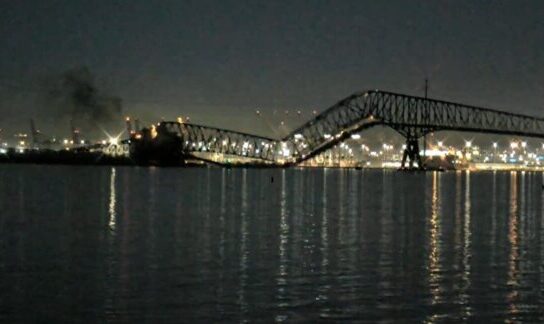
Maryland lawmakers approved a bill Monday evening that supports Port of Baltimore workers who were impacted by the Francis Scott Key Bridge collapse, one in a slew of bills passed in the waning hours of the 90-day state legislative session.
The PORT Act, introduced by Senate President Bill Ferguson March 29, allocates funding to people and businesses impacted by reduced port activity.
The legislation also establishes a scholarship fund for children, stepchildren and spouses of construction workers who were killed in the collapse to help cover tuition and mandatory fees at some colleges and trade schools.
The bill will directly support the families of those who died in the collapse as well as people suffering from past incidents, such as last year’s Beltway crash that killed six construction workers, according to Eric Luedtke, Gov. Wes Moore’s chief legislative officer,
“It’s critical that we help those workers and their families who rely on the port for their livelihoods,” Del. Luke Clippinger, who represents Baltimore City, said during a hearing Thursday. “So that we ensure that they can put food on their tables and pay their bills during the time that the channel is not completely open to traffic.
The legislation authorizes use of the state’s rainy day funds to help port employees who can’t work while the area is closed and aren’t covered by unemployment insurance.
It also allows Moore to use state reserves to provide relief to some small businesses and to encourage relocating companies to return to the port when it reopens.
The collapse blocked the main channel to the Port of Baltimore, severely limiting its operation and stunting economic activity. The U.S. Coast Guard has opened temporary channels through the wreckage for vessels involved with cleaning debris, but the full channel isn’t expected to open until the end of May, according to officials.
Clippinger said the Port of Baltimore accounts of $3.3 billion in individual income for Marylanders. The collapse will have statewide and national impacts, as more than 15,000 jobs in the state are directly connected to port activity and about 140,000 jobs are in some way related to the port, he said.
“The Port of Baltimore is a historic engine for the state of Maryland that has always operated,” Ferguson said. “It has always operated nearly a full capacity even in the midst of COVID.”
Six workers were killed in last month’s collapse after a cargo ship crashed into the Key Bridge. Three people who remain missing are presumed to be dead, Coast Guard officials said.
The state is working to recover all missing people who were killed in the collapse, Luedtke said. It’s one of four goals Moore has outlined in the aftermath of the collapse, which also include reopening the channel, supporting people affected by the destruction and rebuilding the Key Bridge.
The bill addresses all four of Moore’s goals, Luedtke said.
“This is necessary because we need, when the channel is open again, to have a port that is fully functional,” he said.
While the federal government is working close with the state, there will continue to be emergency orders to address various needs and potentially legislation next session, Luedtke said.
President Joe Biden supplied the state with $60 million in emergency relief funds March 28 to help rebuild the bridge, and has pledged to prioritize the construction.
“It’s not a matter of weeks, it’s going to take months to get back to normal,” Luedtke said. “It’s not just about the immediate challenge.”

